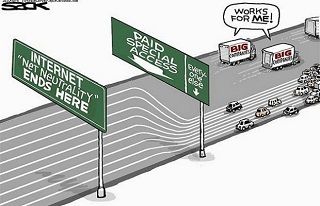Incredible Turnaround in the Future of Free Speech

This is very good news for almost everyone except for the huge forces in the communications industry, whose profits would have gone through the roof if they were able to provide an “Internet fast lane” for themselves and their subsidiaries, and to sell to certain customers, while those of us who couldn’t afford it would have had users complaining about slower downloads, or, more likely, simply disappearing.
Comcast ($16.8 billion in third quarter revenue, up 4% from the year-ago period) has been the most vocal single opponent to Net Neutrality, and they were not at all pleased with what Wheeler had to say. This needs to be understood in the context that Comcast is an organization that is accustomed to getting its way. For those wishing to learn a bit more on the subject, here’s an article on Comcast’s efforts to buy off the U.S. Congress in this case, and here’s one on another huge case less than a year ago, where Comcast used its political action committee to pay many lawmakers responsible for overseeing the acquisition of Time Warner Cable. Comcast reportedly gave 15 of the 18 members of the Senate Judiciary Committee as well as 32 of the 39 members of the House Judiciary Committee some type of compensation or donation. Both committees were due to partake in hearings regarding the Comcast deal.
An old school chum of mine with whom I grew up in Philadelphia happens to know Brian Roberts, Comcast CEO, and he’s mentioned to me on a couple of occasions how personable a fellow he finds Roberts to be. “He just a super guy,” my friend summarizes, and I’m sure he’s being sincere. But when I hear this (and knowing what I do about Comcast and its business practices, Net Neutrality in particular) I always think silently: “Super guy. That’s nice. He can afford to be super.”
I’m reminded of my high school tennis coach, who told us this before a match against a rich-as-God prep school with incredible players who were certain to kill us:
These people have impeccable manners. In fact, all rich people have great manners, which were taught to them from the time they were infants. They speak perfect English, and they’re bound for terrific colleges and inherited wealth, but, above everything else, they’re extremely polite. After all, they’re born winners! Why on Earth wouldn’t born winners be polite and sportsmanlike?
Boys, when you take the court, I want you to work hard, concentrate, and find your very best game. Maybe you can get your opponent behind in the match, under pressure, about to lose. In the event that you can accomplish this, I want you to notice the behavior of the young man across the net from you. See how good his manners are when he’s losing. I don’t think you’ll be too impressed.
It appears that Comcast will lose its challenge to Net Neutrality–at least for now. It’s possible that there will be no appeals, and that the Internet, the world’s dominant mode of distributing information, will remain equally available to everyone, uncorrupted by multi-billionaires and the interests of our largest corporate empires.
Perhaps Roberts will be gracious in defeat. But I doubt it.

Of 132 countries studied, the United States ranks a disappointing 23rd in access to cellphones and the Internet – 20% of us have no Internet access.
If ISP’s are to be regarded in law as publishers, and granted editorial power over content – to edit, hobble and block as they choose – then the vital portion of the Public Commons known as “The Internet” will shortly and tragically complete it’s metamorphosis into little more than 1) a method of surveillance and control and 2) an interactive TV we can shop through.
They must be regarded in law as what they are – telecom pipelines.